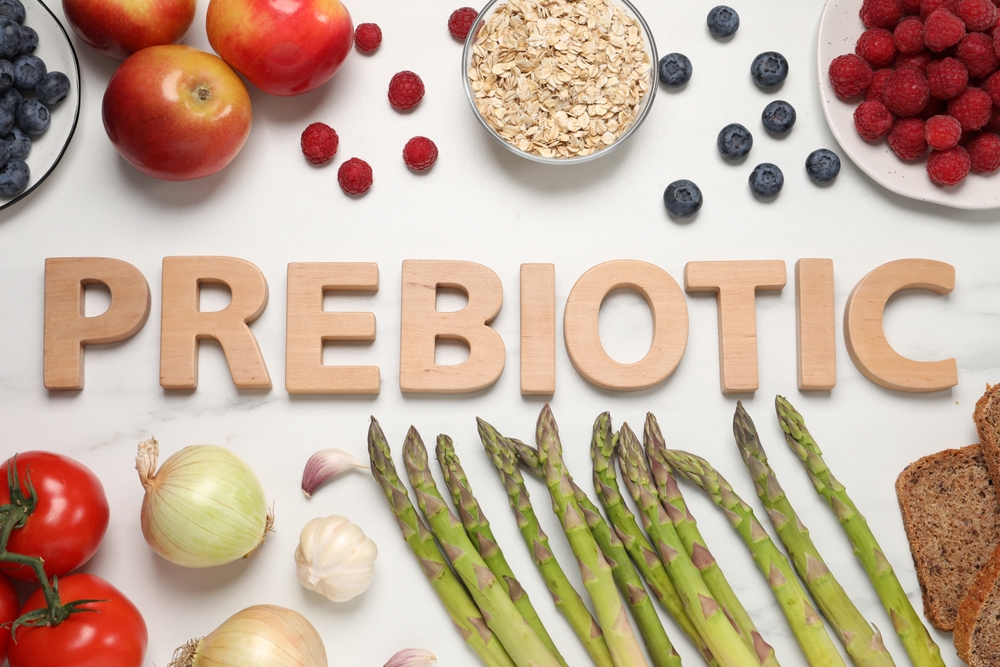Most of us are well aware that probiotics and high-fiber foods provide numerous benefits and are very important to our overall health. However, prebiotics are often overlooked and insufficient in the typical American diet.
Unfortunately, this can lead to major issues like inflammation, indigestion, weight gain, impaired immunity, and even an increased risk for many chronic diseases.
Are prebiotics better than probiotics?
Ideally, you should include both in your diet. While foods high in probiotics help keep your digestive system healthy, prebiotics are food for probiotics to boost the health benefits even more.

What Are Prebiotics?
By definition, prebiotics are types of fiber that don’t get digested but are degraded by gut microflora.
Prebiotic compounds, like other high-fiber foods, travel through the upper part of the digestive system and remain undigested because the human body cannot fully break them down. Once they leave the small intestine, they reach the colon, and that’s where they get fermented by the gut microbiota.
It is worth mentioning that prebiotics weren’t recognized as prebiotic fiber compounds at first. However, recent studies have found that these compounds function similarly to other types of fiber. Today, most prebiotic carbohydrates studied in humans are galactans and fructans, and both of them are fermented by anaerobic bacteria found in the large intestine.
Certain foods are considered natural prebiotics. Some of these examples include dandelion greens, leeks, garlic, and chicory root.
What are the benefits of prebiotics?
Increasing your prebiotic intake has been associated in studies with a long list of benefits, including:
- better gut health
- improved digestion
- lower risk for heart disease
- lower stress response
- healthier cholesterol levels
- higher immune function
- better hormonal balance
- lower inflammation
- lower risk for weight gain and obesity
- better managed autoimmune symptoms
What is the difference between probiotics and prebiotics?
Prebiotics are compounds that are fermented by the healthy bacteria found in the gut and used as a source of food to help boost gut flora health. Probiotics, on the other hand, are live microorganisms that can provide health benefits to the host, ranging from better brain function to improved immunity.
When it comes to supplements, which is best: prebiotics or probiotics?
Both of them have numerous health benefits and work together to improve both digestive and overall health. That’s why one isn’t necessarily “best” because they team up to improve things like immune function, nutrient absorption, appetite control, and so on.
While the benefits of probiotics have become popular in recent years, especially with the increasing popularity of fermented foods like kimchi, kombucha, and sauerkraut, prebiotics still remain under the radar. All forms of fiber that we get from eating whole, plant foods play an important role in digestive health and nutrient absorption.
Can you take probiotics and prebiotics together?
Yes, and you should do so. Prebiotics and probiotics work together to boost overall health, so nearly everyone can afford to incorporate them into their diets more often.
As prebiotics pass through the stomach without being digested by either digestive enzymes or gastric acids, they bring some positive changes in the digestive organs and tract. Essentially, prebiotic compounds serve as “fuel” for the “good bacteria” housed within your gut.
They also play a major role in preserving health by maintaining diversity and balance of intestinal bacteria, especially by increasing the presence of healthy bacteria, such as Bifidobacteria and Lactobacilli.
Because gut health is so closely linked to many other physical processes that occur in your body, prebiotics and probiotics together are essential for lowering overall disease risk and battling inflammation.
Here are the 7 benefits of prebiotics!

1. Improved Digestion and Better Gut Health
Prebiotics stimulate the growth of healthy bacteria that live in your stomach. Since prebiotic compounds act like food for probiotics, they help balance toxins and harmful bacteria living in the digestive tract.
This has many health benefits, including improving digestion. When you eat foods rich in fiber, the healthy bacteria in your digestive tract use the non-digestible fiber from those foods as fuel for their own survival. As your stomach bacteria metabolize those indigestible fibers, they produce short-chain fatty acids, which are known to offer numerous health benefits.
Studies suggest that short-chain fatty acids may help promote proper digestion, relieve digestive issues like constipation and diarrhea, and support regularity.
2. Enhanced Immune Function
Many human studies have shown that eating high-prebiotic foods can result in considerable changes in the composition of the gut microbiota. As a result, this can help improve immunity.
The experts named this the “prebiotic effect”, which has been associated with improvements in activities and biomarkers of the immune system, including low levels of certain cancer-promoting bacteria and enzymes in the gut.
According to a report published in the British Journal of Nutrition, prebiotics can help improve poop consistency and frequency, decrease the incidence of allergy symptoms, reduce the risk of gastroenteritis and other infections, and boost overall health.
Prebiotics and probiotics also help enhance immunity by boosting nutrient absorption and lowering the pH in the digestive tract to block the growth of harmful bacteria and potential pathogens.
Plus, some studies have found that eating high-prebiotic foods reduces the incidence of cancer cells and tumors.
3. Lower Inflammation
Prebiotics can help reduce inflammation, which is thought to be one of the main causes of several chronic diseases, including our nation’s leading killer: heart disease. Actually, people consuming more fiber and prebiotics tend to slash bad cholesterol and have a lower risk of cardiovascular diseases.
Inflammation is also believed to play a key role in many other chronic conditions, such as cancer, diabetes, and obesity. Surprisingly, prebiotics and probiotics are related to improvements in metabolic processes linked to both type 2 diabetes and obesity.
Studies also show that a healthier gut environment can help your body absorb nutrients more efficiently, stop autoimmune reactions, and regulate immune functions that control where and how the body stores fat.
4. Reduced Risk of Heart Disease
Several studies have shown that the alteration of intestinal microbiota is associated with many diseases, including heart disease. Also, the imbalance of the gut microbiome has been seen in heart failure, arterial hypertension, thrombosis, and atherogenesis.
There is evidence that eating high-prebiotic foods can reduce glycation, which triggers inflammation, lowers insulin resistance, and increases free radicals, all of which can contribute to cardiovascular disease.
Prebiotics also boast cholesterol-lowering properties. That’s why eating high-prebiotic foods can help reduce your risk of heart disease and autoimmune disorders like arthritis. They can also balance the body’s mineral and electrolyte levels, which regulate blood pressure.

5. Aid in Weight Loss
Following a high-prebiotic diet and losing weight may be related, according to recent data from both animals and humans. Research notes that certain prebiotics have positive effects on energy homeostasis and may even promote weight loss.
In fact, a high-fiber diet is associated with lower body weight and the prevention of obesity.
A British Journal of Nutrition study published in 2002 found that prebiotic foods increase satiety, spur weight loss, and prevent obesity. Studies showed that animals given probiotics produce lower levels of ghrelin, the hormone that stimulates hunger. In other words, prebiotics produce effects on hormone levels that are related to appetite regulation.
6. Protect Bone Health
As we grow older, our bones become more brittle and may fracture more easily. While both men and women are likely to develop bone loss, women are more at risk for bone disease as they age, suffering more from conditions such as osteopenia and osteoporosis.
According to a Journal of Nutrition study published in 2007, prebiotics help the human body absorb more minerals, including magnesium, possibly calcium, and iron. All of these are essential for preventing fractures or osteoporosis and retaining strong bones. Another study found that just eight grams of prebiotics per day have a great impact on the body’s absorption of calcium, which is known to increase bone density.
7. Regulate Mood and Hormone Levels
While research on the “gut-brain connection” is still in its early stages, it’s becoming increasingly obvious that mood disorders like depression and anxiety are closely linked to gut health. Studies suggest that your hormonal balance and mood are affected by a number of factors that includes the state of the bacteria living inside of your body.
Your digestive system helps absorb nutrients from the foods you eat, which are then used to promote neurotransmitter processes that create hormones. Most of these hormones are responsible for relieving stress and controlling your mood.
Here’s the thing: when the balance of the gut microbiome isn’t working properly, other biological pathways, including neuronal, immunological, or hormonal, won’t function right either.
Recent studies have found that prebiotics have major neurobiological effects on the human brain, including lowering the body’s stress response and cortisol levels.
Prebiotic Foods
While probiotics are often found in fermented and cultured foods like yogurt, kefir, and kombucha, prebiotics are typically found in whole grains, certain vegetables (especially raw ones), and sources of resistant starch, such as under-ripe bananas.
Here are a few of the best high-prebiotic foods that you can incorporate into your diet:
- Raw garlic
- Raw chicory root
- Acacia gum (or gum arabic)
- Raw dandelion greens
- Raw Jerusalem artichoke
- Raw leeks
- Raw jicama
- Raw or cooked onions
- Raw asparagus
- Yacon syrup
- Under-ripe bananas
You may also want to read High-Fiber Foods: 15 Best Options, According to Nutritionists.








1 thought on “7 Reasons to Include Prebiotics in Your Diet — Plus the Best Sources”
You could add how often and how much guide lines with this post since most of those things listed are not pleasant to eat, though I haven’t tried chicory root, Acacia gum, Jerusalem artichoke, jicama or Yacon syrup raw or otherwise. Plus, just how under ripe do the bananas need to be? And most of those foods listed will be unpleasant to eat raw. In particular garlic and dandelion greens as I have eaten both uncooked and one is very strong and the other bitter eaten cooked or raw. Other than that, your info was helpful if a bit long winded, like my comment. Thank you.